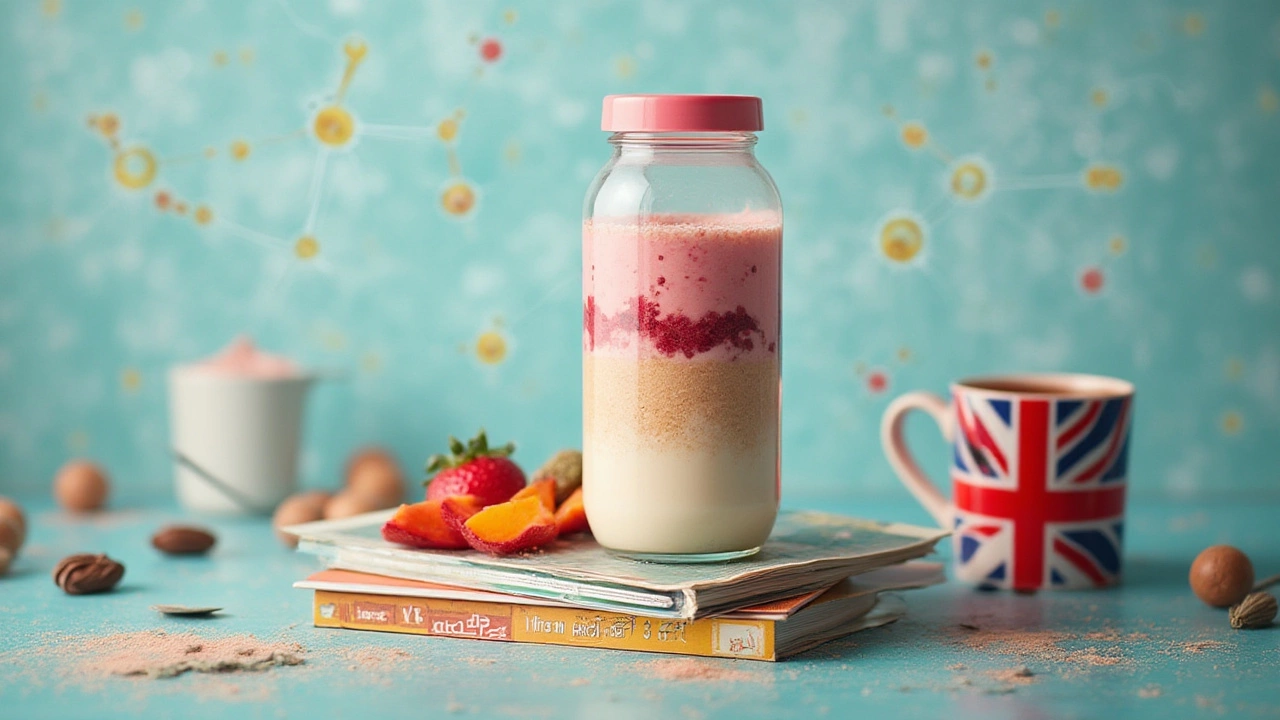Is It Safe to Drink a Protein Shake Every Day? The Real Impact on Health and Fitness

Ever thought about skipping breakfast and grabbing a protein shake instead? Or maybe you’ve watched gym-goers blend up something chalky in the corner and wondered if you should be doing it too. Protein shakes have become the go-to snack for everyone from athletes to busy parents. But is it really okay to drink one protein shake every single day? Let’s untangle the science, weigh the risks and perks, and bust through the myths that swirl around this famously convenient drink.
What Happens When You Drink a Protein Shake Every Day?
There’s something kind of sleek and satisfying about reaching for that cold bottle or shaker first thing in the morning or after your workout. Protein shakes are everywhere—just pop into any supermarket in Bristol and you’ll spot half a dozen brands, each shouting about muscle gain or ‘lean and green’ magic. But what goes on inside your body when you start sipping a shake each day?
First off: a typical protein shake ranges from 15 to 30 grams of protein per serving, often in the form of whey, pea, soy, or rice protein. Most adults need about 0.75 grams of protein per kilogram of body weight daily. For context, someone weighing 70 kilograms (about 154 pounds) needs roughly 52 grams of protein a day, says the British Nutrition Foundation. One shake could easily cover a big slice of that. But, here’s the kicker: your body doesn’t truly care if the protein comes from chicken or chia seeds—or a shake—as long as you get enough quality protein for your needs, spaced throughout the day.
What’s cool is that protein is famous for keeping you full. It stimulates the release of hunger-busting hormones, meaning a shake might help curb random snacking. That’s why you see those stories about people dropping weight just by swapping one meal for a shake. Additionally, if you’re working out or aiming to build muscle, daily protein is a non-negotiable, and shakes make hitting your protein target a breeze, especially post-gym when you’re way too sweaty or tired to cook a full meal. There’s also some evidence—like a 2022 study published in the journal Nutrients—that regular protein supplementation can help older adults maintain muscle, reducing the risk of falls and frailty.
Daily shakes can also be a blessing for vegetarians or vegans who struggle to get enough protein from just plants. And, let’s get real: most days, making an actual meal packed with protein takes effort. Who wants to scramble an egg or grill a chicken breast at 7am before work?
But there are bits most people forget: not all protein shakes are created equal. Some are loaded with added sugars, thickeners, weird artificial flavors, and a mountain of unpronounceable ingredients. That ‘health’ shake can sometimes sneakily deliver more sugar than a biscuit. If you’re aiming for clean nutrition, always check the nutrition label. Look for straightforward ingredients: protein source, maybe a little natural flavoring, and not much else.
Let’s talk numbers for a second. Here’s what you might find in an average commercial protein shake vs. a homemade one using simple whey or pea protein:
| Type | Protein (g) | Sugar (g) | Calories | Fat (g) |
|---|---|---|---|---|
| Commercial Shake (Ready-made) | 20 | 10 | 180 | 3 |
| Homemade (Whey, water, banana) | 24 | 7 | 160 | 2 |
| Homemade (Pea, almond milk, berries) | 23 | 5 | 150 | 2 |
It’s wild how much these can vary, right? That’s why reading those tiny lines on the back of the bottle actually matters.

Risks and Misconceptions: Is Daily Protein Too Much of a Good Thing?
So, is there any real harm in getting a protein shake into your daily routine? Here’s where we get honest. For most healthy adults, drinking one shake a day won’t cause any health meltdowns. But things can go sideways if it means you’re skimping on whole foods or forgetting about the rest of your diet. Some people get so hyped on shakes, they forget vegetables exist or ditch breakfast for something blended and boring. Shakes should always supplement—not replace—real food.
Now, let’s squash a common myth: “Too much protein will destroy your kidneys.” Unless you’ve got pre-existing kidney disease, adding an extra 20-30 grams of quality protein won’t send you to A&E. A widely quoted 2020 review in the American Journal of Kidney Diseases found no harm in high-protein diets for healthy people. Yes, if you already have kidney problems, then it’s a different story—so always talk to your doctor if you have any doubts.
Another sticky bit: digestion. Some people (including my friend Katy, who tried going all-in on vegan shakes for a month) find they get bloated, gassy, or run to the loo more often. Whey protein, made from milk, can spark trouble if you’re lactose intolerant, and even some plant-based ones can upset sensitive bellies due to high fibre or added thickening agents. If you’re new to shakes, maybe don’t go chugging a whole bottle in one go—sip slowly, let your gut get used to it.
Then there’s the sugar trap. Lots of ‘healthy’ shakes come with as much sugar as a fizzy drink, dressed up with pictures of pumpy biceps. Over the years, companies have toned the sugar down a bit, but you can still find some nearly as sweet as a dessert. Too much sugar drives up your risk of weight gain and tooth decay, overshadowing any benefits from the protein. Always go for the ‘unsweetened’ or naturally sweetened versions if possible.
Let’s not forget allergies and sensitivities. If you’ve got a soy allergy, clearly dodge soy-based shakes. And while rare, some people do react to certain additives, so if you notice rashes or an itchy mouth after a shake, don’t ignore it.
And then there are goals. If you’re not especially active, your body may not need as much protein as fitness buffs. Extra protein can quietly add up to extra calories. If you’re slurping a shake each day and not adjusting your other meals, those calories might start sticking around as body fat. For people trying to lose weight, it pays to include protein shakes as part of a fuller nutrition plan, not just as random add-ons.
For athletes, though (or weekend warriors like Matthew), shakes earn their keep. After heavy gym sessions or runs along the River Avon, his muscles need the building blocks protein provides. For the rest of us, if you’re eating balanced meals and not skipping food groups, you probably don’t “need” a shake—but they can make busy days easier. Just be mindful: a shake shouldn’t replace a meal unless you’re in a bind, and always keep those veg and healthy carbs on your plate.

Smart Ways to Fit Protein Shakes Into Your Diet
Ready for a twist? The best way to fit protein shakes into your day isn’t about smoothies packed with fancy super-seeds or green powders. The real trick is to use them with purpose and awareness, not just out of habit or as a trendy shortcut. Here are tips and facts to help make it work for you, not against:
- Be picky with ingredients: Choose plain, high-protein powders with minimal sugar and as few artificial extras as possible. Unflavoured whey or pea protein is perfect for most people. Scan labels for sweeteners or strange additives—if you can’t pronounce it, think twice.
- Treat shakes like real food: A shake that simply replaces food isn’t a miracle cure. Pair it with fruit, oats, seeds, or nuts if you need a proper meal replacement. If you’re using protein just as a snack, keep the extras light.
- Check your timing: After a workout, your muscles actually benefit from quick-digesting protein. But you can have a shake anytime—morning, afternoon, or even dessert. Listen to your hunger; don’t force it just for the sake of “fitness.”
- Watch your portion: Going overboard gets you nowhere. One shake a day covers most gaps; rarely do you need more. Best to get the rest of your protein from real, tasty food—think fish, eggs, tofu, beans, yoghurt, and lentils. (My go-to is Greek yogurt with berries… almost as easy as a shake.)
- Keep it balanced: If you’re having a shake every day, make sure the rest of your meals aren’t all beige and boring. Pile high with greens, whole grains, and healthy fats.
- Listen to your body: If you start feeling strange or bloated, try a different protein source, adjust portion size, or take a break. Your gut will thank you later.
- Stay hydrated: Extra protein needs extra water—don’t forget your giant water bottle, especially after a shake.
There’s loads of flexibility in how you add shakes to your day. Some folks keep a stash at their work desk for those emergency, I-skipped-lunch-again moments. Others prep shakes at home with frozen fruit, spinach, and a scoop of unflavoured powder, then carry a cold flask on the school run.
And here’s a fact you won’t hear from shake brands: the key to lasting results isn’t about gulping down a daily supplement. Consistency in real food choices—and listening to your hunger and needs—always wins out. For some, a daily shake is a lifesaver; for others, it’s just another thing cluttering up the fridge.
If you’re unsure, jot down your daily foods and see how much protein you’re really getting. There are tons of free apps to track this. Most people in the UK get plenty from regular meals and only really need a shake on rushed days or when exercising more. But if you love the convenience, or it helps you curb unhealthy snacking, that’s a good enough reason to stick with it.
So, is it OK to drink one protein shake every day? For healthy adults who enjoy a shake and watch their whole diet, absolutely. But nothing beats real, colourful meals when you have the time—and no single shake will transform you overnight. Stay curious, read the label, stay hydrated, and don’t be afraid to experiment. Just remember: what works for your neighbour, gym buddy, or even your favourite Bristol-based writer with a soft spot for chocolate-flavoured whey, might not always be perfect for you.